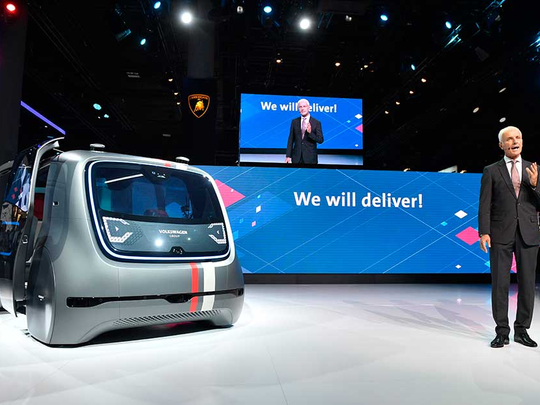
Frankfurt
Volkswagen AG is putting its full force behind a shift into electric cars as the world’s largest automaker accelerates away from combustion engines and tries to draw a line under the emissions-cheating scandal that’s weighed on the company for two years.
Speaking on the eve of the Frankfurt auto show, Chief Executive Officer Matthias Mueller announced sweeping plans to build electric versions of all 300 models in the 12-brand group’s line-up. The German auto giant laid out the enormity of the task ahead, vowing to spend 20 billion euros ($24 billion) by 2030 to roll out the cars and earmarked another 50 billion euros to buy the batteries needed to power the vehicles.
Volkswagen’s plans are the most ambitious in the auto industry and reflect the company’s efforts to recover from admitting that it rigged 11 million diesel vehicles to cheat on emissions tests. The scandal set off a backlash that has led consumers to turn away from the technology amid concerns about pollution and driving bans. That creates problems for Volkswagen as it relies on diesel cars to boost profit and lower carbon-dioxide emissions to reach tightening European environmental targets.
“We have got the message and we will deliver,” Mueller said in his speech to hundreds of guests at the carmaker’s event in the German financial capital. “The transformation in our industry is unstoppable. And we will lead that transformation.”
Before the scandal, German automakers were hesitant about electric cars because of the high costs and limited range. Diesel, meanwhile, was a convenient choice because it generated peppy acceleration while emitting about a fifth less CO2 than comparable gasoline engines. Mueller on Monday said that diesel remains a key part of the company’s strategy. Dieter Zetsche, his counterpart at Daimler AG, said he regrets that consumers have lost trust in diesel.
Adding urgency to the push for electric cars, China over the weekend became the latest country to announce intentions to phase-out fossil-fuel powered vehicles, following the lead of the UK and France, which have outlined bans on combustion-engine models by 2040. The move by China, the world’s biggest auto market, is sure to accelerate a global shift to electrics. Mueller said the company would await firm commitments before reacting.
Volkswagen is throwing the fire power of brands such as Audi, Porsche and Skoda behind the push, aiming to overwhelm the likes of Tesla Inc with its size and market power and transform from a battery-vehicle laggard into a leader. Tesla has started to roll out the $35,000 Model 3 to broaden its appeal and stem billions of dollars in losses. Leaving its upmarket niche is putting the Californian start-up on direct collision course with traditional automakers like VW, Toyota Motor Corp and Nissan Motor Co. as falling battery costs are forecast to make electric cars more affordable in coming years.
VW, Daimler and BMW AG are accelerating electric-vehicle plans to react to slumping sales of diesel models amid the fallout from VW’s cheating scandal. With their big cars, German automakers are particularly reliant on diesel in their home market of Europe and had been banking on the fuel-efficient engines to help meet ever tougher emissions rules that will tighten further early next decade.
Underscoring the enormity of the shift taking place in the industry, Mueller said VW will need the equivalent of at least four gigafactories for battery cells by 2025 just to meet its own vehicle production. At 50 billion euros, the CEO announced one of the largest tenders in the industry’s history for the procurement of batteries.
“Financially we’re very robust,” Mueller said in a Bloomberg TV interview. “We’ll generate the money we need to make these investments.”
Economies of scale
By 2025, VW aims to have 50 purely battery-powered vehicles and 30 hybrid models in its line-up, with a goal of selling as many as 3 million all-electric cars by then. The transformation will pick up speed after that to reach the 2030 goal as economies of scale and better infrastructure help bring down prices and accelerate sales.
The automaker in Frankfurt is giving the public its first glimpse of the coming overhaul of the product portfolio. The namesake brand is presenting the latest design iteration of the fully-electric I.D. Crozz compact crossover and the I.D. Neo hatchback — both come to market in 2020.
Luxury brand Audi, the group’s largest earnings contributor, will start selling its first all-electric SUV in 2018 and add two more purely battery-powered vehicles in the next three years. The premium-car brand is slashing spending to free up 10 billion euros to develop an electric-car line-up that will comprise as many as 12 models in 2025.
“The heated debate on driving bans in cities, on the future of diesel and e-mobility shows the times when our industry celebrated itself here in Frankfurt, basking in its own glory, are definitely over,” said Mueller, who arrived on stage in a self-driving prototype dubbed Sedric. “’Business as usual’ is no longer enough.”












